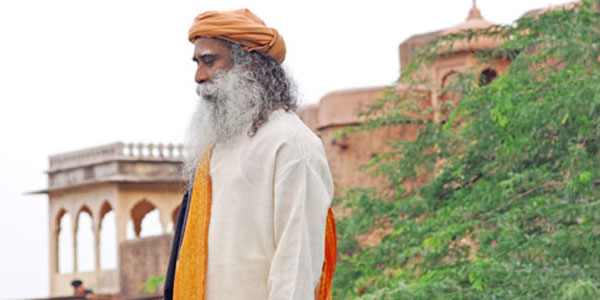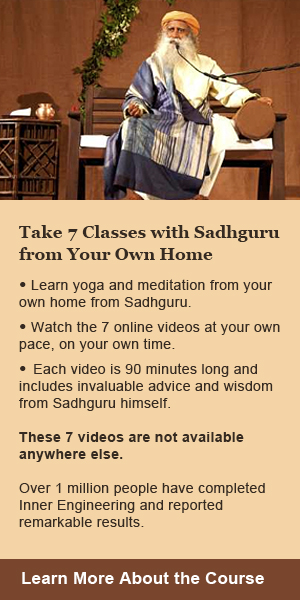Mahabharat Episode 54: Dharma – An Absolute or Relative Truth?

“If your intention and actions are towards a larger wellbeing, Krishna is with you.” —Sadhguru
Yudhishthira: Righteousness above All Else
Questioner: Sadhguru, you said that people followed Yudhishthira because he is the king and seen as the manifestation of godliness. But why are people still following him after he made some crazy decisions? And how come Krishna does not intervene, or how come he does not ask Krishna for advice?
Sadhguru: You think they are crazy decisions? That is a very bad judgment on Yudhishthira. Yudhishthira is going by the law. He does not want to tell a lie; he does not want to break the law. And he says, “I don’t even want to be a king.” There is nothing wrong with that. Had he always been aspiring to be a king at any cost, and then he did not want to do it, you could say he is crazy or stupid. But if he says, “I don’t even want to be the king. I just want to be truthful,” is he not a great guy?
There is nothing wrong with the man. But because he is trapped in the compulsions of a certain action, he is made to look stupid, because the situations are propelled by a predetermined force, and he does not understand where it is going. He is just trying to be a righteous man, and he does not fit in properly. That is all his problem is. He did not make crazy decisions; he made decisions that were honored in those days. Even today, if someone gives you something that is valuable to them, you will look at them with a certain regard, respect, and reverence. Everyone looked at him with that same reverence, respect, and regard. Because they had their own compulsions, they raged against him, but they knew he was right in many ways. He was trying to follow what is written in the scriptures to whatever extent was possible for him.
Krishna’s Take on Dharma
Questioner: Sadhguru, when Duryodhana and Arjuna went to Krishna to request his alliance, Krishna sent his army, the group of people who relied on him completely, to fight alongside Duryodhana, the side which he knew for sure was going to be defeated. What is his dharma as a king?
Sadhguru: His dharma is the dharma of being practical. Dharma can be seen as an ancient law, or it can be viewed according to the current situation. You need to understand this before you make judgments. Each of these characters exists within you and depending on the situation it can be decided which one should be enhanced in you. The Duryodhana in you, the Arjuna in you, the Yudhishthira in you, the Karna in you, or the Krishna in you – which one should be brought forth. Do not go about making judgments. Someone who looks like a fool may come out as the winner in the end. Someone who looks evil comes out as divine in the end. Someone who seems to be righteous, comes out all wrong. It happens every day with our lives.
You must see what Krishna’s stake is in the whole thing – he has nothing to lose, nothing to gain. He has a prosperous kingdom of his own; he could happily live there. When the Pandavas talk as if Krishna is their property, Krishna reminds them, “I love Duryodhana and his brothers as much as I love you, but I am standing with you because you are truthful, and only as long as you are truthful. I am not standing with you because I hate them and love you.”
Now your question is, “He is the one who is telling them not to be truthful.” Truth is not a verbal thing; truth is an existential thing. For example, in the last few days, there was a series of bombings across the world, but there were no fatalities. Ideally, they want to bomb a place where there is maximum human concentration, so they can cause maximum damage. This Mahabharat program would be a great target in that sense, because there is a high concentration of human beings here. When such an opportunity is there, if they ask, “Is the Adiyogi Alayam [hall in the Isha Yoga Center] full of people,” what should I tell them? The truth? The ultimate truth is to act out of your inclusiveness.
The question is, are you acting out of your inclusiveness or are you acting out of your exclusiveness? That is what Krishna’s dharma is about. If your intention and actions are towards a larger wellbeing, Krishna is with you. If your intention and action are towards your exclusive wellbeing, he is not with you. That is the statement he is making. Whatever happens, he is constantly trying to push it towards inclusiveness. If anyone comes in the way, he is willing to do whatever is needed.
Whatever morality you may have, ultimately, when things come to a crux in your life, this is what everyone will do. If someone stands in the way of your wellbeing, you will talk to them; you will try to shake hands with them; you will try to restrict them; you will do whatever you can. If nothing works and they still stand in your way, what will you do? You will remove them. Krishna has no qualms about stating the truth. You will also do that, but you do not have the courage to admit it now.
Even in the most hopeless situation, Krishna personally makes a journey from King Virata’s city back to Hastinapur. In those days, to make such a journey of four hundred, five hundred kilometers, you have to be super determined towards your purpose – otherwise, you would not have made it. When Duryodhana clearly says he will not give even a needlepoint worth of land and they are hopelessly determined to fight, still Krishna goes there, risking his life.
Had Krishna been a simple man, they would have captured him. Getting killed was considered better than getting captured by Duryodhana. But he takes the risk, goes there, and still sues for peace. Though he knows they are hopelessly determined, he still tries to do his best. But when all attempts to sue for peace fail, he is willing to do what he has to do, unwaveringly. Others also want to do that, but they lack the necessary determination to fulfill what needs to be done, because they are more concerned about their own thoughts and emotions.
To be continued..
Editor's Note: A version of this article was originally published in the Forest Flower magazine, December 2019. To subscribe online, click here. The Mahabharat series is based on Sadhguru’s talks during the one-time Mahabharat program that took place in February 2012 at the Isha Yoga Center. Through the lives and stories of the varied characters, Sadhguru takes us on a mystical exploration into the wisdom of this immortal saga.


